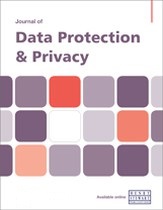Understanding the scope and impact of the California Consumer Privacy Act of 2018
Abstract
The California Consumer Privacy Act of 2018 (CCPA or the Act) marks a groundbreaking development in US privacy law. While the CCPA ostensibly regulates business practices involving the personal information of Californian consumers, the size, population and economic importance of California means the CCPA will be felt by businesses far beyond California’s borders. Just as Europe’s General Data Protection Regulation (GDPR) required many multinationals to conform their personal information processing to Europe’s high standards in data privacy, the CCPA is poised to have a similar effect in the USA when it goes into effect in 2020. Large companies and businesses that rely on the collection and dissemination of personal information from Californian consumers will need to begin evaluating their exposure now so as to move their operations into compliance. As a result, the CCPA will begin to have a noticeable effect on the personal information collection and disclosure practices of certain dataintensive industries. Moreover, the CCPA is likely to serve as a testing ground and catalyst for other laws pertaining to personal information and data privacy concerns. Thus, it is important to understand the impact of the CCPA in California, in the USA and globally. This paper discusses the scope and impact of the CCPA and critically evaluates the CCPA’s anticipated impact on businesses across select industries. Next, this paper contextualises the CCPA with the GDPR, identifying key similarities and differences between the two regimes. Finally, this paper looks ahead at how the CCPA may affect state and federal law on privacy and personal information protection.
The full article is available to subscribers to the journal.
Author's Biography
Elizabeth (Liz) Harding is a dual-qualified attorney in Colorado and the UK who counsels clients on data privacy, advertising and technology licensing matters. Prior to practising in the USA, she practised law in the UK for over 10 years, counselling clients on EU privacy and technology matters.
Jarno J. Vanto His strengths lie in his ability to intimately understand each client’s specific industry technology and his awareness of the complex international environment. His extensive international experience allows him to provide a differentiated perspective to clients on privacy, cyber security, intellectual property and corporate matters.
Reece Clark counsels multinational clients on privacy, data security and matters involving complex intellectual property licensing. Reece leverages his project management background in delivering effective client representation involving matters of information technology and system security. Reece consistently delivers strong analytical skills, critical problem-solving and a people-focused approach to his practice.
L. Hannah Ji is dedicated to understanding each client’s business model, practices and objectives to help them protect and profit from their investment in a variety of technologies. She utilises her experience to advise a wide variety of industries including global manufacturers, healthcare conglomerates, sourcing providers, retail companies and global online businesses. Hannah frequently represents clients on privacy and data security, trademark, copyright and various intellectual property matters.
Sara C. Ainsworth is an associate in the corporate and transactional practice. Clients rely on Sara to work with Polsinelli’s team of attorneys to analyse each transaction matter to develop a strategic approach to representation based on the client’s immediate and long-term business and operational goals.
